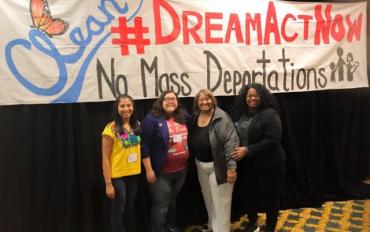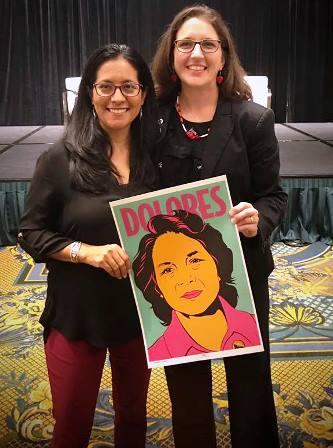"An attack on one is an attack on all."
That was the theme of the AFT Civil, Human and Women's Rights Conference Oct. 13-14 in New Orleans, where activists made clear the need to join together in the fight for equity and justice.
Framed in the context of the Janus v. AFSCME Supreme Court case—a case that could weaken labor unions by restricting the fee collection they need to serve their members—the conference demonstrated the deep connection unions have with human rights groups and underscored the contributions unionists make to a broad spectrum of social justice causes. The point was clear: Weaken the union, and you weaken support for everything from LGBTQ rights to voting rights, immigration rights, women's rights, racial justice, economic justice and that great equalizer, high-quality public schools for all. Besides which, the right to form a union and have a voice in the workplace is another type of civil right; Janus is an assault on that.
"The forces behind this case are the same forces that have pushed for limiting voting rights, attacked immigrants and undermined civil rights protections," said AFT Executive Vice President Mary Cathryn Ricker (pictured below with Camila Chávez, Dolores Huerta's daughter).
"Unions must be focused on all the conditions that improve people's lives. It is up to us to live that bedrock union value that an injury to one is an injury to all."
One theme unified workshops on multiple facets of civil, human and women's rights: that regardless of what happens with Janus, the union and the civil rights associated with it can be strengthened if we work together. "We must stand up and fight back against number 45," said AFT Secretary-Treasurer Lorretta Johnson (pictured above, second from right), referring to President Trump. "Fight for high-quality public schools and public services."
Workshops brimming with passion
Participants were moved to tears in a workshop on immigration rights and the fate of undocumented families. Areli Zarate, an AFT teacher with DACA status, and Julieta Garibay, who helps direct United We Dream, an organization for young DACAmented people, described the deep fear in communities where people are sometimes yanked from their beds and sent "back" to countries they've never really known. DACA status—Deferred Action for Childhood Arrivals—allows recipients to work and go to school legally without the threat of deportation, but since Trump revoked it, even those with DACA status are afraid of being deported.
After moving descriptions of lives torn apart by the threat of deportation, AFT Vice President Kathy Chavez pleaded tearfully with participants to help immigrant families and vowed she would stand with them. The AFT offered resources to advise families about their legal rights and tools to help them navigate the system should they be faced with immigration officers and/or deportation. The organization is also fighting for the Dream Act, legislation that would protect DACA holders and other immigrants.
Another workshop examined how unions connect with their communities in a range of circumstances. Nurses from the Public Employees Federation, an AFT affiliate in New York, recently traveled to Puerto Rico to help distribute food and clean water and check the health status of people stranded by Hurricane Maria. In Texas, Houston Federation of Teachers members swooped in to help after Hurricane Harvey, mopping up mildew, providing hot meals and more. Members in Broward County, Fla., help run a food bank of fresh produce that allows families in a "food desert," an area with no grocery stores, get healthy food. "You all exemplify what it means to build community through action," HFT President Zeph Capo, who is also an AFT vice president, told members.
In a workshop examining specific ways to keep public schools strong regardless of how the Janus case is decided, panelists decried the closing of neighborhood schools in low-income areas—particularly in Chicago—and outlined the dearth of teachers of color, a circumstance that diminishes the education of students who feel misunderstood and left out in white-dominated spaces. Black teachers can be "educational equalizers," said Conra Gist, a professor at the University of Arkansas and an expert in black teacher development. She described roadblocks to increasing the number of black educators and possible solutions, such as "grow your own" programs. Research shows that having just one teacher of color in early elementary school significantly improves outcomes for black boys, she said.
The issue came up again in a plenary about charter schools. While charters sometimes have more teachers of color, other elements make them hugely problematic: Black students in charters are four times more likely to be expelled, for example. Studies show that charters increase segregation, many perform poorly, they take funding away from public schools and, in some cases, the corporations that run them are using public money to purchase buildings they get to keep for other uses after their charter schools close.
A workshop on voting rights brought all these issues together: "Healthcare, public schools, racial equity, criminal justice reform—all of those issues go through voting rights to get there," said Ricker. But voter access is threatened. Participants described voter suppression in their communities: the elimination of Sunday voting, confusing changes to assigned polling places, voter ID requirements and long, time-consuming lines with no accommodations for disabled and elderly voters.
The Voting Rights Act is essential to preventing such devices, said Nicole Austin-Hillery, director of the Brennan Center for Justice, and her center is fighting against recent efforts to gut some of the act's most important aspects. She described three tools to increase voting equity: automatic voter registration, which registers people to vote when they interact with government agencies, such as departments of motor vehicles; cybersecurity measures; and the Democracy Restoration Act, which allows felons who have served their time to vote. She also described voter apathy as a problem. "It doesn't matter how big your mouth is, there is no voice as powerful as when you go in that voting booth and pull that lever or use that screen," she said.
[Virginia Myers]


